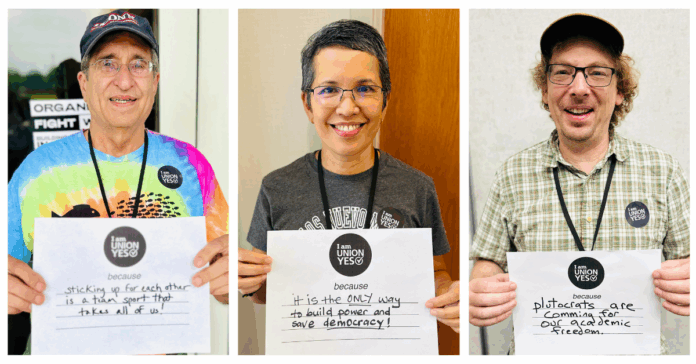“The professors are the enemy” may have seemed like little more than a vulgar political slur, but in 2025, it underpins a destructive policy agenda. The hostile and threatening climate was top of mind for the hundreds of faculty and staff at our national union’s annual higher education conference. Leaders and activists from Connecticut traveled to Atlanta in mid July to focus on building the power needed in these precarious times to defend themselves, students and communities.
The 2025 Summer Institute, jointly organized by our national American Association of University Professors (AAUP) and AFT, was held on the historic Morehouse College campus. Members and staff with state federation-affiliated higher education chapters joined their colleagues from across the country for four days of workshops and plenaries addressing the monumental challenges facing the profession.
“Every day, increment by increment, we’re losing our democracy,” said Oskar Harmon (left, in collage above), who serves as treasurer of our AFT Connecticut-affiliated UConn-AAUP. “That’s why we came: to organize, engage in community support and learn new techniques to advance this cause. Our charge was to go back to our universities and talk to our colleagues, our legislators and then to national organizations. That’s what we motivated and prepared ourselves to do,” he added.
National AAUP President Todd Wolfson’s opening remarks on the first day of the conference magnified the partnership between the two organizations and the tremendous opportunity in this unprecedented moment. He urged the largest gathering of higher education activists across the country since the 2022 affiliation of our unions to build a powerful and resilient movement.
The second day featured a morning plenary on moving members into action, followed by a variety of workshops on a wide range of timely topics. Participants packed lecture halls to learn how to defend historically black colleges and universities, build solidarity through shared governance and thwart escalating attempts to curtail academic freedom.
“We’re studying the evolving landscape and producing resources to support faculty,” said Trinity AAUP Chapter President and AAUP Center for the Defense of Academic Freedom Director Isaac Kamola (right, above). “We have a full syllabus with readings and we’ve also produced what we’re calling a ‘first aid kit.’ There, we have resources to protect faculty from threats, curated legal resources, like immigration lawyers, as well as digital security and doxing defenses,” he added.
National AFT Secretary-Treasurer Fedrick Ingram presented during the afternoon plenary, calling on attendees to expand their vision during these tumultuous times. He reminded members of their obligation as activists, quoting the 19th-century abolitionist and civil rights pioneer, Frederick Douglass: “power concedes nothing without demand.”
The agenda for day three of the conference was packed with three plenary sessions and 11 workshops, several of which focused on empowering leaders to organize members around priority issues. Topics ranged from defending vulnerable students and colleagues to bargaining for the common good and winning pro-higher education state-level legislation.
National AFT President Randi Weingarten participated in the lunch plenary, which took on the weighty issue of “Democratic Backsliding and How We Resist It.” She was joined by Faith in Action National Network Political Director Cassandra Gould, Horizons Project Co-Lead Maria Stephan and Human Rights Campaign Social Advocate Erica McPheeters.
Together, they warned against attempts to allow divisions between PreK-12 and higher education, pointing out that both are targets because of the power in teaching knowledge, agency and empowerment. Critical thinking, problem-solving, empathy, resilience and relationship-building all threaten the rise of authoritarian regimes.
I co-led the afternoon plenary and a workshop, each aimed at teaching communications and organizing skills to leaders and activists. In the first, I shared the success achieved last year by AFT Connecticut affiliates and labor coalition partners in fending off privatization of the state’s only public medical academic center. The second focused on developing and implementing effective public relations strategies.
Members got even more active with a hands-on mass mobilization training on the last day of the conference, learning tactics for successful, nonviolent demonstrations. AFT Union Leadership Institute Deputy Director Darrell Capwell teamed up with Lisa Fithian from the Alliance of Community Trainers to lead participants through de-escalation techniques and real-world scenarios.
“We’re going to escalate and we’re going to activate more and more members,” said CSU-AAUP member Rotua Lumbantobing (center, above). “We’re going to keep growing density and we’re going to build our capacity to be a fighting union. There will be rallies and protests but we also have to build relationships. We need our coalition partners, our communities and – most importantly – our students,” added Lumbantobing, who also serves as AAUP’s national vice president.
Whether it’s in the streets, at the bargaining table or organizing through one-on-one conversations, Summer Institute participants left both inspired and equipped to meet the moment.
Editor’s note: additional contributions from Virginia Myers, AFT.



